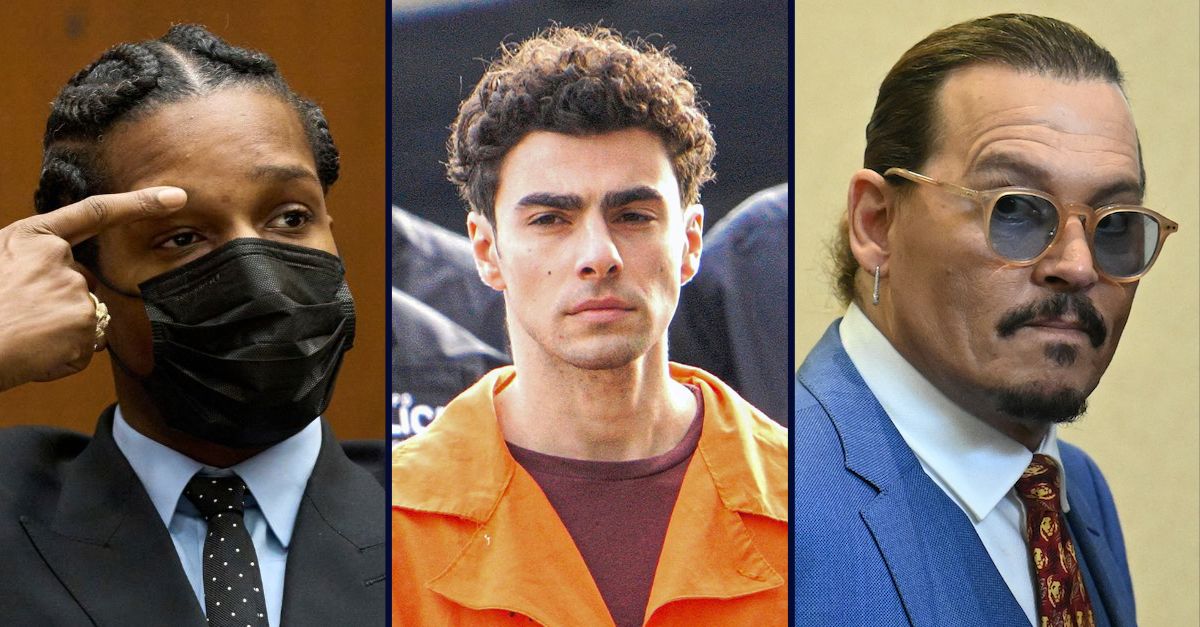Share this @internewscast.com

Left: Rakim Mayers, better known as A$AP Rocky, present at the Clara Shortridge Foltz Criminal Justice Center during a preliminary hearing related to his charge of assault with a semiautomatic firearm in Los Angeles, Monday, Nov. 20, 2023 (Allison Dinner/EPA via AP, Pool). Center: Photo by: zz/XNY/STAR MAX/IPx 2024 12/19/24 Luigi Mangione, accused of the murder of UnitedHealthcare CEO Brian Thompson, seen arriving at the South Street Helipad in New York City, December 19, 2024, after his extradition from Pennsylvania (NYC). Right: Johnny Depp spotted at the Fairfax County Circuit Courthouse in Fairfax, Virginia, on May 24, 2022 (Jim Watson/Pool/AFP via Getty Images).
The phrase “Fame is a double-edged sword” was likely coined in the context of a bustling courtroom or while digesting the recent headlines of a captivating trial that drew national attention.
The allure of fame has perennially captivated audiences, particularly in America, and it seems we have reached an apex in our obsession with public recognition and visibility. During Hollywood’s golden era, fame was reserved for a select group of glamorous actors and musicians. This exclusivity persisted for years. However, over recent decades, the concept of fame and the pathways to achieving it have broadened significantly. In today’s era of social media, influencers have emerged, amassing millions of followers and fortunes merely by showcasing their authentic selves. Fame today is within reach for anyone determined enough to pursue it.
In the past few years, we’ve seen a slew of celebrity cases play out in courtrooms (some with cameras and some without), and a variety of verdicts, which many legal analysts and onlookers at least partially attribute to the reputation and following of the defendant. Now, what plays out in the court of public opinion seems to be just as important as the actual courtroom itself, and social media platforms like TikTok that cultivate a community of online users with tons of opinions, commentary, and even internet sleuthing only add to the fervor. But how has the factor of fame actually played out legally in the past several decades? And how will it affect other defendants in the years to come?
The favor of fame
Often times, if a celebrity facing charges — or even bringing a case as a plaintiff — has cultivated a positive relationship with fans and even as an overall brand, that can work in the person’s favor. The most recent example we’ve seen is rapper A$AP Rocky, who was just acquitted of assault with a semiautomatic firearm in a criminal case which would have gotten him more than 20 years in prison if convicted. A$AP Rocky had already built a large following from his award-winning musical career, but arguably garnered even more fans when he began dating his now-partner, the singer Rihanna, with whom he now has two children.
By the time his trial began in November 2024, many were speculating how much of the defendant’s fanfare and following would play into the jury’s potential decision. Even the prosecutors had the “fame factor” on their minds — in the closing argument, Deputy District Attorney John Lewin asked the jurors not to be swayed by the celebrity of the defendant, and even suggested Rihanna bringing their children to closing arguments was an attempt to influence the jury. After the verdict, A$AP Rocky’s attorney Joe Tacopina told the press that Rihanna brought the children to court because depending on how the trial ended, it could have been the last time they would have seen their father for years.
Another recent celebrity who was able to utilize his stardom in the courtroom was Johnny Depp. In 2022, Depp brought a civil lawsuit against his former wife Amber Heard for defamation, which was televised all around the world. The trial uncovered many ugly details of the pair’s toxic relationship, including distasteful text messages, audio recordings, and photos. Despite this, Depp prevailed and his fan base remained as devoted as ever, while Heard took a major hit in terms of her public image. Many onlookers during the trial were skeptical Depp would prevail, especially since the trial went into lengthy detail regarding his past history with drugs and even showcased some of the foul language he used when describing his ex-wife — yet not only did Depp win, but his popularity soared during the process. After the trial, 72% of millennials viewed Depp favorably, meanwhile Heard faced a great deal of what many deemed public scrutiny and misogyny during and after the case.
So what is it exactly about fame that can help celebrities in the courtroom? For one, it could be that the public is more likely to side with a celebrity that people around the world not only love, but grew up watching and even associate with aspects of their childhood. For Johnny Depp, many millennials who watched the trial closely associate him with many roles they watched him in over the years, including the “Pirates of the Caribbean” franchise. Even Heard’s attorney acknowledged the advantage of “power” and “fame” Depp had during the trial, only encouraging fans’ loyalty to someone they grew up watching.
Secondly, nowadays with social media and constant 24/7 coverage of an ongoing trial, onlookers and potential jurors are besieged with videos of other online users dissecting a trial, oftentimes with a view leaning toward one side versus the other. This raises the question of how a potential juror can possibly be untainted by any online commentary regarding parties of a case in this day and age — again, Heard’s attorney commented at the end of the trial how the jury was undoubtedly influenced by social media.
Thirdly, being a celebrity in many cases means having immense wealth and privilege at your disposal, therefore being able to hire the best attorneys money can buy. Many surmise that was the case with O.J. Simpson’s “dream team” of lawyers, who were able to get an acquittal for their client despite all the evidence showing otherwise.
The cons of notoriety
Like many things in life, fame can have just as much of a negative impact on a celebrity plaintiff or defendant as a positive one. Just this past year, we have seen multiple celebrities face intense backlash as public figures, which has spilled over into their actual cases. Firstly, in the summer of 2024, Blake Lively began facing intense scrutiny on social media over her demeanor toward others (including reporters) and the way she marketed her film focusing on domestic violence, “It Ends With Us,” alongside promoting her hair care line and alcoholic beverages. Months later in December 2024, she filed a sexual harassment suit against her director Justin Baldoni, yet the public reaction against Lively only worsened — in fact, in a recent Law&Crime poll during live coverage of the latest court hearing, it was revealed that 96% of online users following the trial are siding with Baldoni.
While the facts and charges in the case of music industry mogul Diddy vastly differ from the Lively/Baldoni dispute, Diddy’s very public downfall will likely affect the civil lawsuits that have been filed against him since 2023, and his eventual criminal indictment. When Diddy’s ex Cassie Ventura filed a lawsuit against him in November 2023, he denied the allegations and general details for months, yet in May 2024, a video surfaced showing Diddy beating Ventura in a hotel hallway in 2016, backing Diddy into a corner and forcing him to give a half-hearted apology. By September 2024, federal authorities arrested Diddy on sex trafficking charges and he has been held in jail ever since, awaiting the start of his May 2025 trial. In the past several months, hundreds of civil lawsuits have been filed against Diddy, he has faced professional and financial losses, and much of the public has turned against him.
The outcomes of the Lively and Diddy cases still have yet to be decided, but based on public reactions of both of them at this current moment, the outlooks do not look excellent. In what ways can a celebrity’s negative backlash harm their chances at trial?
Celebrities and non-celebrities as symbols
Defendants in courtrooms often represent themes and ideas greater than themselves to the public, and we have seen this play out, both with famous parties and non-famous ones. The O.J. Simpson criminal case is often referred to as the “trial of the century,” and still sparks interest even decades later. At the time of the 1995 acquittal, Los Angeles was in a precarious time: the Rodney King beating had occurred just years prior, with the police officers charged with attacking him all being acquitted in 1992 and the resulting riots that occurred just after. Long-standing tension and issues between the Los Angeles Police Department and the African American community had come to a boiling point, and by the time the Simpson trial came around, many had apparently wanted to see a Black defendant prevail in a criminal courtroom, no matter what the context of the case was. In the 2016 documentary “O.J.: Made In America,” one of the jurors, Carrie Bess, said she voted to acquit Simpson as “payback” for the Rodney King beating and that 90% of the other jurors likely felt the same way. In his heyday, Simpson was a wealthy, strong, and famous football player and actor, breaking barriers for African American men in the 1970s; by the time of the criminal trial, many wanted to see a win not just for him, but for the entire community.
Even those who have not cultivated a career of fame by the time their case unfolded can still become symbols for greater issues. When Luigi Mangione was charged with the murder of United Healthcare CEO Brian Thompson in December 2024, he was immediately met with an overwhelming amount of support online, particularly on social media. Many online users took to the internet initially to gush over Mangione’s good looks and pedigree from a prominent Baltimore family, while others praised him for taking a stance against the health care industry. Mangione’s alleged manifesto included criticism of the American health care industry, which many view as corrupt, expensive, and self-serving. Rather than just looking at evidence or the facts of the case, people are viewing Mangione as a quasi “folk hero,” seeking a vendetta and justice against a corrupt health care system. With many online and throughout the country praising Mangione as seeking to right a long-standing wrong, it would not surprise even me if this were to impact the potential verdict — not because of Mangione as a person, but what so many in the public have assigned him to represent through this action.
No matter what your opinion may be of fame or celebrities, no one can deny that it will not go away anytime soon — in fact it only seems to become more and more prevalent as the use of social media and technology rises through the years. What we can be certain of is that many will be watching how the outcomes in cases such as Diddy, Blake Lively, Justin Baldoni, and Mangione turn out, and how the notoriety of all individuals involved will affect the end result.

















